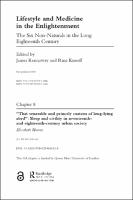Chapter 8 “That venerable and princely custom of long-lying abed”
Proposal review
Sleep and civility in seventeenthand eighteenth-century urban society
Author(s)
Hunter, Elizabeth
Collection
WellcomeLanguage
EnglishAbstract
Elizabeth Hunter considers sleep in terms of the relationship between English medical ideas about healthy lifestyle and the social context in which idleness and the husbanding of time had powerful connotations in terms of class, gender and morality. She starts with Dekker’s The Gull’s Hornbook (1609), which took on the nocturnal habits of the “gallants” of London, before turning to the role of sleep and health in John Locke’s Some Thoughts Concerning Education (1693). Like Schmidt in Chapter 9, she draws attention to the impact of bourgeois conceptions of time and productivity on the dietetics of sleep. Her final principal source is George Cheyne, a familiar figure from many other chapters in this volume. After years of excess and late nights, Cheyne adopted a new healthy regimen and wrote about its success. The fashionability of an ostentatiously unhealthy late-night, late-rising rakish lifestyle contrasted with more puritanical bourgeois instincts and mainstream health advice, which continued to take a tough line on the poor sleep regime. Hunter shows how the “nocturnalisation” of life in cities like London created a medical/moral reaction.
Keywords
Cheyne, England, health, Locke, London, productivity, rest, sleep, timeDOI
10.4324/9780429465642-8ISBN
9780429465642, 9781138610705Publisher
Taylor & FrancisPublisher website
https://taylorandfrancis.com/Publication date and place
2020Imprint
RoutledgeClassification
Humanities
History


 Download
Download